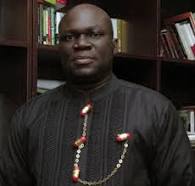 It is not about Chief Edwin Kiagbodo Clark. That will be a mistake. It is about leadership, versus the aroma of it and scent that is often mistaken for purpose.
It is not about Chief Edwin Kiagbodo Clark. That will be a mistake. It is about leadership, versus the aroma of it and scent that is often mistaken for purpose.
Former Presidential Spokesperson Reuben Abati went to town on E.K. Clark’s reported disowning of his “son”, former President Goodluck Jonathan, who was Abati’s boss. From his vantage viewpoint inside the bowels of power when Clark called the shots around Jonathan, Abati wrote in the mass media with authority on the closeness of the Clark-Jonathan relationship. Abati knows very well what kind of “father-and-son” the President and his Godfather were. And neither of the duo left anyone in doubt. When the snail crawled, its shell followed it.
Abati expressed clearly his disappointment with Clark in his piece, titled: “Clark, The father, Jonathan, The Son”. He said: “Who would ever think, Chief E.K. Clark would publicly disown President Jonathan? He says Jonathan was a weak President. At what point did he come to that realization? Yet, throughout the five years…of the Jonathan Presidency, he spoke loudly against anyone who opposed the President. He was so combative he was once quoted as suggesting that Nigeria could have problems if Jonathan was not allowed to return to office”.
Abati ‘s agony about the “father” who called his “son” a nincompoop in so many words is comprehensible. Especially barely five months after the son was dethroned.
But only that far. Abati missed many points of significance in seeking to arouse public sympathy for Jonathan and condemnation of Clark .
The first one is that he failed to say who Chief Edwin Clark is. Let us imagine a scenario: “What manner of a person are you”, it was asked. Hear the response: “I eat and I eat.” Yesterday it was Jonathan. Today it is Buhari. As it was before, so it is today, and forever. Such people inhabit the living rooms of power, and seek entry into the bedrooms. Once in the inner rooms, they are bosom friends of the boss, so-called insiders. Show me your friends, I can tell who you are. Any leadership that has as confidants such personalities is handicapped. Is Clark shopping for another entry into the current living room of power? It is unlikely that Buhari will open the access door. Already in anticipation of no entry, Clark declared that he had become a “Statesman” and did not belong any longer to any political party.
Secondly, power attracts so-called followers. They come in droves and they come day and night. They sing, they dance, and they even weep, if weeping is what the boss wants. They love the boss. They tell him only what he wants to hear. If he is their type, he sings with them, dances with them, and seek comfort in their tears. Such negative leadership is enslaved by its own follower and friends, enemies of the progress that comes from openness and discourse.
Thirdly, many people are available to advise and inform the boss of what to do and who to choose as collaborators. These advisers and informants claim space and time. There is a kind of boss who cedes to them her/his time and space. In a symbiotic relationship of sorts, the boss becomes a slave and appendage of the advisers and informants. The boss serves them and they use the space and time to serve only their narrow, selfish interests. Leadership disappears and parochialism, self interest dominate.
Fourthly, “it is our turn” or “myownersation” is a dream come true to a boss whose sentiments are at best confused. The boss finds many willing acolytes. Where vision and principles are amiss, “turn-by-turnism” fins a home. When power “miss road”, its abuse becomes commonplace. Leadership in the genuine sense limits confusion. It comes to power with a sense of mission, purpose and direction. It has no room for “myownersation”.
What language Abati used for Clark can be used for many more people – appendages, dependents, opportunists, usurpers – who use closeness to power in pursuit of personal gains at the expense of the community, society.
Show me a leader who leaves power and maintains his key flock and I will show you leadership that galvanizes its people. If Clark abandons his son, it is not out of character. Behind closed doors or within limited public view there are many like-minded others following the same road of abandonment of yesterday’s group. There is a limit to followership that has as platform what-is-in-it-for-me. In the “chop-make-I-chop” politics that characterizes our polity, principles and ideologies are absent, or rare.
Abati, whose phone does not ring anymore as he stated in an earlier article, knows keenly that serious friendship and ardent believers in service as an end are few at the State House or Executive Mansions.
Makinwa is a communication for leadership entrepreneur based in South Africa and Nigeria.
Twitter: @bunmimakinwa


Be the first to comment